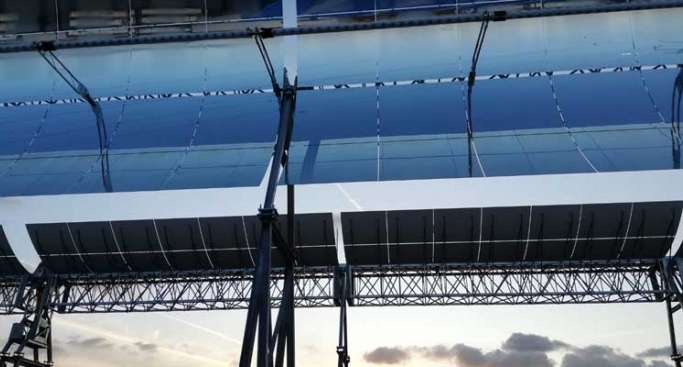Port of Antwerp installs Europe’s first industrial solar concentrator
October 23, 2019: Port of Antwerp today announced the inauguration of the first ‘Concentrated Solar Thermal Plant’ (CST) in European process industry that could generate eco-friendly heat from sunlight for Adpo Logistics in Beveren, Belgium.

October 23, 2019: Port of Antwerp today announced the inauguration of the first ‘Concentrated Solar Thermal Plant’ (CST) in European process industry that could generate eco-friendly heat from sunlight for Adpo Logistics in Beveren, Belgium. The plant was installed by the Genk-based energy company Azteq as part of a pilot project co-financed by the Flemish government.
Jacques Vandermeiren, CEO, Port of Antwerp, said "As Port of Antwerp we have a pioneering role to play in the energy transition. Together with industry, we are working to reduce CO2 emissions and make the transition to alternative energy sources, so as to become a CO2-neutral port. We aim to accomplish this by means of ambitious transition projects, using methanol, hydrogen, wind power etc. We want to be a testbed for technological innovation that helps us on the way to a sustainable future. I am therefore proud that this promising technology is being tested first in Port of Antwerp."
Groene warmte op basis van geconcentreerd zonlicht? Dat kan vanaf nu bij ADPO in Beveren dankzij de baanbrekende #warmtetechnologie van het #zonnespiegelpark van AZTEQ, mede gefinancierd door de Vlaamse Overheid. Een unicum in Europa! Lees: https://t.co/7WhmKcponJ #duurzaamheid pic.twitter.com/iud8NjF1Fc
— Port of Antwerp (@PortofAntwerp) October 23, 2019
Industrial companies normally obtain heat for their processes from the combustion of fossil fuels such as natural gas. Concentrated Solar Thermal energy is an innovative technology in which sunlight is concentrated by parabolic mirrors and so converted directly to heat. The temperatures reached can be as high as 400°C, thus providing high-grade heat that can be used in industrial processes. The heat can be stored in insulated containers so that it is also available for use at night. The technology is an eco-friendly alternative for industrial heating requirements and so can make a significant contribution toward reducing CO2 emissions.
Filip De Dijcker, managing director, Adpo, said "Investing in the transition to sustainable, renewable energy is in our DNA. The current project is not our first foray into sustainable energy. We already generate 700 MWh of electricity per year from solar panels, and the first LNG/CNG gas station was built on our terminal five years ago. We are also making our contribution to the modal shift: thanks to a new container quay we transport 10,000 containers per year by water instead of by road, and we have made significant investments in a rail connection and a direct pipeline connection for two of our companies."
Until now Adpo Logistics has used gas to produce the steam that it uses for cleaning and heating tanks and containers. This requires temperatures of more than 140°C, well within the capabilities of CST technology. The CST farm that will replace 500 MWh of gas consumption annually is installed above the company's car park, above a railway line and underneath a high voltage line, thus providing an example of the double use of the ground area. The solar reflectors, each 5 m long and installed in lines of 120, follow the path of the sun and focus the incident sunlight on collector tubes.
Koen Vermout, CEO, Azteq, said "With this technology, we aim to decarbonise a significant part of industrial energy requirements by 2030. This initiative in the port is one of the pilot projects that we are able to put into practice thanks to the support from the Flemish government. We want in particular to demonstrate the feasibility of this technology and to establish it here. In addition to Flanders, there are also plans for projects in the Netherlands, France, Germany, Austria and Spain. Making the supply of heat for the industry more eco-friendly not only leads to significant reductions in CO2 emissions but also to technical progress and job creation in a future-oriented circular economy."



